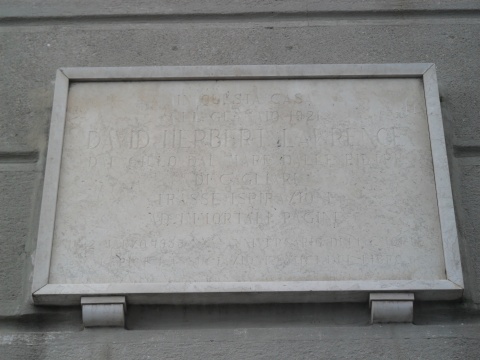David Herbert Richards Lawrence (1885-1930) was an English writer, poet, playwright, essayist and painter, considered among the most emblematic figures of the twentieth century. Together with several writers of the time, he was among the greatest innovators of Anglo-Saxon literature, especially for the issues addressed.
His most famous and controversial novel is "Lady Chatterley's Lover" and, thanks to his long stays in Italy and Sardinia, he was able to compose various poetic travel diaries. He dedicated beautiful pages to Cagliari in the third chapter of his work "Sea and Sardinia" of 1921. He thus described the city of the sun:
“Strange, stony Cagliari. We climbed up a street like a corkscrew stairway. And we saw announcements of a children's fancy-dress ball. Cagliari is very steep. Half-way up there is a strange place called the bastions, a large, level space like a drill-ground with trees, curiously suspended over the town, and sending off a long shoot like a wide viaduct, across above the corkscrew street that comes climbing up. Above this bastion place the town still rises steeply to the Cathedral and the fort. What is so curious is that this terrace or bastion is so large, like some big recreation ground, that it is almost dreary, and one cannot understand its being suspended in mid-air. Down below is the little circle of the harbour. To the left a low, malarial-looking sea plain, with tufts of palm trees and Arab-looking houses. From this runs out the long spit of land towards that black-and-white watch-fort, the white road trailing forth. On the right, most curiously, a long strange spit of sand runs in a causeway far across the shallows of the bay, with the open sea on one hand, and vast, end-of-the-world lagoons on the other. There are peaky, dark mountains beyond this—just as across the vast bay are gloomy hills. It is a strange, strange landscape: as if here the world left off. The bay is vast in itself; and all these curious things happening at its head: this curious, craggy-studded town, like a great stud of house-covered rock jutting up out of the bay flats: around it on one side the weary, Arab-looking palm-desolated malarial plain, and on the other side great salt lagoons, dead beyond the sand-bar: these backed again by serried, clustered mountains, suddenly, while away beyond the plain, hills rise to sea again. Land and sea both seem to give out, exhausted, at the bay head: the world's end. And into this world's end starts up Cagliari, and on either side, sudden, serpent-crest hills.
But it still reminds me of Malta: lost between Europe and Africa and belonging to nowhere. Belonging to nowhere, never having belonged to anywhere. To Spain and the Arabs and the Phœnicians most. But as if it had never really had a fate. No fate. Left outside of time and history.
The spirit of the place is a strange thing. Our mechanical age tries to override it. But it does not succeed. In the end the strange, sinister spirit of the place, so diverse and adverse in differing places, will smash our mechanical oneness into smithereens, and all that we think the real thing will go off with a pop, and we shall be left staring.”
To commemorate the stay of the famous English author, a plaque was posted in Queen Margareth Avenue at the former Hotel Scala di Ferro, where the man stayed.
Lapide Commemorativa di David Herbert Lawrence
Lapide Commemorativa di David Herbert Lawrence
Viale Regina Margherita, 48
City
CagliariAdd new review
Your review will be visible after approval by the editors
To post a review you must be an authenticated user.
Log in with Social Login
